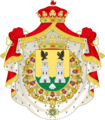Adolfo Suárez facts for kids
Quick facts for kids
The Most Excellent
The Duke of Suárez
|
|
|---|---|
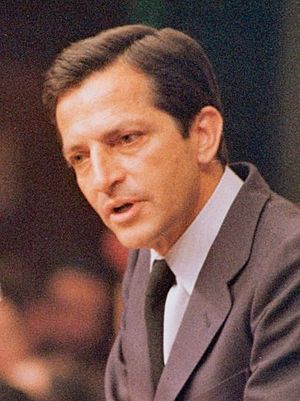
Suárez in 1979
|
|
| Prime Minister of Spain | |
| In office 5 July 1976 – 26 February 1981 |
|
| Monarch | Juan Carlos I |
| Deputy | Manuel Gutiérrez Mellado |
| Preceded by | Fernando de Santiago (Acting) |
| Succeeded by | Leopoldo Calvo Sotelo |
| President of the Liberal International | |
| In office 26 April 1989 – 22 April 1992 |
|
| Preceded by | Giovanni Malagodi |
| Succeeded by | Otto Graf Lambsdorff |
| President of the Democratic and Social Centre | |
| In office 2 October 1982 – 26 May 1991 |
|
| Preceded by | Party established |
| Succeeded by | Rafael Calvo Ortega |
| President of the Union of the Democratic Centre | |
| In office 21 October 1978 – 9 February 1981 |
|
| Preceded by | Party established |
| Succeeded by | Agustín Rodríguez Sahagún |
| Minister-Secretary General of the Movimiento Nacional | |
| In office 12 December 1975 – 6 July 1976 |
|
| Preceded by | Ignacio García López |
| Succeeded by | José Solís Ruiz |
| Deputy Secretary General of the Movimiento Nacional | |
| In office 21 March 1975 – 2 July 1975 |
|
| Preceded by | Antonio García Rodríguez-Acosta |
| Succeeded by | Antonio Chozas Bermúdez |
| Director General of RTVE | |
| In office 14 May 1969 – 25 June 1973 |
|
| Preceded by | Jesús Aparicio-Bernal |
| Succeeded by | Rafael Orbe |
| Civil Governor of the Province of Segovia | |
| In office 31 May 1968 – 7 November 1969 |
|
| Preceded by | Juan Murillo de Valdivia |
| Succeeded by | Mariano Pérez-Hickman |
| Member of the Congress of Deputies | |
| In office 22 July 1977 – 26 October 1991 |
|
| Constituency | Madrid |
| Personal details | |
| Born |
Adolfo Suárez González
25 September 1932 Cebreros, Ávila, Second Spanish Republic |
| Died | 23 March 2014 (aged 81) Madrid, Spain |
| Resting place | Cathedral of Ávila |
| Political party | Democratic and Social Centre (1982–1991) |
| Other political affiliations |
FET y de las JONS (1958–1977) Union of the Democratic Centre (1977–1982) |
| Spouse |
Amparo Illana Elórtegui
(m. 1961; died 2001) |
| Children | 5 including Adolfo |
| Parents | Hipólito Suárez Guerra Herminia González Prados |
| Alma mater | Salamanca University |
| Occupation | Jurist |
| Signature | |
Adolfo Suárez González, 1st Duke of Suárez (born September 25, 1932 – died March 23, 2014) was an important Spanish lawyer and politician. He became Spain's first democratically elected prime minister after the dictatorship of Francisco Franco. He played a key role in helping Spain become a democracy again.
In 1976, when Spain was still under a strict government, King Juan Carlos chose Suárez to be prime minister. Many people were unsure about him because he wasn't very well known. However, he worked to end the old system and made it legal for all political parties to exist, even the Communist Party, which was a very big step.
Suárez led a group called the Union of the Democratic Centre and won the general election in 1977. He later started a new party, the Democratic and Social Centre (CDS). He stopped being involved in politics in 1991 and public life in 2003, after he became ill with Alzheimer's disease.
Contents
Early Life and Education
Adolfo Suárez González was born on September 25, 1932, in Cebreros, a town in the Province of Ávila, Spain. He was the oldest son of Hipólito Suárez Guerra, a lawyer, and Herminia González Prados.
When he was 18, Suárez was the president of the Catholic Action group in Ávila. He studied law at the University of Salamanca. After finishing his studies, he started working for the local government in Ávila in 1955. He also earned a higher degree from the Central University of Madrid.
Rising in Politics
Early Career Steps
In 1958, Adolfo Suárez became the personal assistant to Fernando Herrero Tejedor, who was the new civil governor of Ávila. As Tejedor moved up in the government, Suárez also advanced. In 1965, Suárez was put in charge of programs for the state TV and radio company, Radio y Televisión Española (RTVE).
During his time at RTVE, he became good friends with Prince Juan Carlos, who would later become king. In 1968, Suárez became the civil governor of Segovia. The next year, in 1969, he was made the director general of RTVE.
In 1975, after Francisco Franco died, Suárez was promoted to a high position in the government by the prime minister at the time. He also helped start a political group called the Spanish People's Union.
Becoming Prime Minister
In July 1976, King Juan Carlos asked the prime minister to step down. To many people's surprise, the King chose Suárez as the new Prime Minister of Spain. At 43 years old, he was the youngest prime minister in Spain in the 20th century.
Even though Suárez had worked in the old government, he quickly started making big changes to bring democracy back to Spain. This period is known as the La Transición.
- New Laws: In November 1976, a new law was passed that allowed people to vote and created a new parliament. People voted for this law in a special election in December.
- Legalizing Parties: Between February and April 1977, Suárez made it legal for all political parties to exist, including the Communist Party. This was a very brave move and made some military leaders angry. Suárez handled this by replacing some of the strict military officers with more open-minded ones.
- First Free Elections: On June 15, 1977, Spain held its first free elections in 41 years. Suárez led his party, the Union of the Democratic Centre (UCD), to victory. He became the first democratically elected prime minister after Franco's rule.
Leading the New Democracy
Suárez's government continued to bring more democratic changes.
- New Constitution: A new constitution was created, which said Spain would be a constitutional monarchy (a country with a king or queen, but where elected officials make the laws). This constitution was approved by voters in December 1978.
- Regional Autonomy: To help with tensions in different parts of Spain, Suárez also worked to create Spain's autonomous communities. These are regions that have their own local governments.
Suárez's party won the elections again in 1979 under the new constitution.
Resignation and Coup Attempt
Over time, Suárez faced many challenges. Spain was going through an economic slowdown, and there was increasing violence from a group called ETA. There were also disagreements within his own party.
In January 1981, Suárez announced he would resign as prime minister. A month later, as the parliament was voting for the next prime minister, a group of Civil Guards led by Lieutenant-Colonel Antonio Tejero stormed the building. They tried to take over the government in what is known as the 23-F coup attempt.
During this scary event, Suárez, along with two other politicians, stayed calm and remained seated while others panicked. The coup failed because King Juan Carlos I spoke out against it on TV, and the military did not support the rebels.
After Being Prime Minister
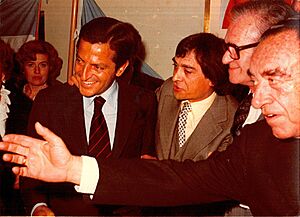
In 1982, Suárez started a new political party called the Democratic and Social Centre (CDS). This party didn't become as big as his first one, but Suárez remained an important figure in international politics. He became the President of the Liberal International in 1988. He left politics in 1991 for personal reasons.
In 1981, King Juan Carlos honored Suárez by giving him the special title of "Duque de Suárez" (Duke of Suárez). This title also made him a Grandee of Spain, which is a very high rank in Spanish nobility. This was to recognize his important work in bringing democracy to Spain.
Suárez received many awards for his contributions. In 1996, he was given the Prince of Asturias Concord Award for his role in Spain's democracy. In 2007, King Juan Carlos made him a Knight of the Order of the Golden Fleece, which is one of the most important awards in Spain.
Illness and Death
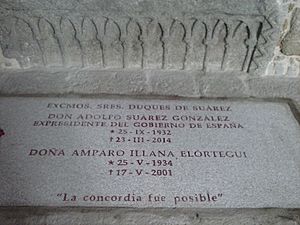
On May 31, 2005, Suárez's son announced that his father was suffering from Alzheimer's disease. This is a condition that affects memory and thinking.
Adolfo Suárez passed away on March 23, 2014, in Madrid, due to a lung infection. He was given a state funeral and was buried in the cloister of Ávila Cathedral.
After his death, Pope Francis sent his condolences, praying for Suárez. On March 26, 2014, the Spanish government decided to rename the Madrid-Barajas Airport to Adolfo Suárez Madrid–Barajas Airport to honor his service to the country.
Family Life
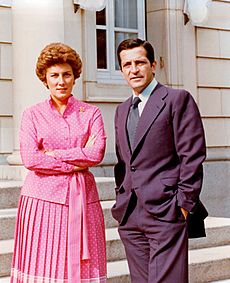
Adolfo Suárez married María del Amparo Illana Elórtegui in 1961. She passed away in 2001. They had five children. Their oldest daughter, Mariam, passed away in 2004. Mariam had two children, Alejandra and Fernando. Alejandra Romero Suárez now holds her grandfather's title as Duke of Suárez.
Suárez's youngest daughter, María Sonsoles Suárez Illana, became a TV news anchor. His oldest son, Adolfo Suárez Illana, is also a politician and lawyer. Suárez also had two other children, Laura and Francisco Javier.
Honours and Awards
Decorations
National
 Spain
Spain
- Knight of the Order of the Golden Fleece (2007)
- Collar of the Order of Charles III (Posthumous, 2014)
- Grand Cross of the Order of Charles III (1978)
- Grand Cross of the Order of Isabella the Catholic (1973)
- Grand Cross of the Order of Civil Merit (1969)
- Grand Cross of the Civil Order of Alfonso X, the Wise (1970)
- Commander's Cross of the Civil Order of Alfonso X, the Wise (1967)
- Grand Cross of the Order of Naval Merit (1972)
- Grand Cross of the Order of Cisneros (1972)
- Grand Cross of the Order of the Yoke and the Arrows (1975)
- Grand Cross of the Military Merit with White Decoration (1970)
Foreign
 Portugal:
Portugal:
- Grand Cross of the Order of Christ (1978)
- Grand Cross of the Order of Liberty (1996)
Awards
- Gold Medal of Segovia (1969)
- Gold Medal of Ávila (1981)
- Adopted Son of Ávila (1981)
- Alfonso X the Wise International Prize in Toledo (1994)
- Gold Medal of Madrid (1995)
- Honorary Degree by the Complutense University of Madrid (1996)
- Prince of Asturias Concord Award (1996)
- Coexistence Award of Ceuta (1999)
- Gold Medal of Castilla y León (1997)
- Medal of Honor of Madrid (2011)
- Adopted Son of Madrid (Posthumous, 2014)
Images for kids
See also
 In Spanish: Adolfo Suárez para niños
In Spanish: Adolfo Suárez para niños
- Puedo prometer y prometo
- Politics of Spain


